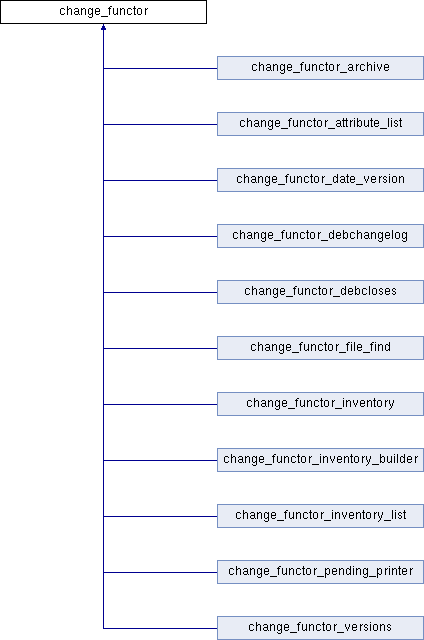#include <functor.h>

Public Member Functions | |
| virtual | ~change_functor () |
| virtual void | operator() (change::pointer cp)=0 |
| bool | include_branches () const |
| bool | all_changes () const |
| virtual time_t | earliest () |
| virtual time_t | latest () |
| virtual bool | recurse_branches () |
Protected Member Functions | |
| change_functor (bool include_branches, bool all_changes=false) | |
| change_functor (const change_functor &) | |
| change_functor & | operator= (const change_functor &) |
Private Member Functions | |
| change_functor () | |
Private Attributes | |
| bool | include_branches_flag |
| bool | all_changes_flag |
Detailed Description
The change_functor class is used to represent an abstract base class used to present object which look like callable functions which take a singe change::pointer argument.
Typically, this is used with the project_inventory_walk function to walk the changes of branch trees.
Constructor & Destructor Documentation
| virtual change_functor::~change_functor | ( | ) | [virtual] |
The destructor.
| change_functor::change_functor | ( | bool | include_branches, |
| bool | all_changes = false |
||
| ) | [protected] |
The constructor. May ony be called by a derived class.
| change_functor::change_functor | ( | const change_functor & | ) | [protected] |
The constructor. May ony be called by a derived class.
| change_functor::change_functor | ( | ) | [private] |
The default constructor. Do not use.
Member Function Documentation
| bool change_functor::all_changes | ( | ) | const [inline] |
| virtual time_t change_functor::earliest | ( | ) | [virtual] |
The earliest method is used to determine the earliest time of interest to the functor.
- Returns:
- time_t; the default implementation returns zero.
| bool change_functor::include_branches | ( | ) | const [inline] |
| virtual time_t change_functor::latest | ( | ) | [virtual] |
The lastest method is used to determine the latest time of interest to the functor.
- Returns:
- time_t; the default implementation returns "now".
| virtual void change_functor::operator() | ( | change::pointer | cp | ) | [pure virtual] |
The operator() method is used to call the functor.
- Parameters:
-
cp The change to be operated upon.
Implemented in change_functor_inventory, change_functor_archive, change_functor_inventory_builder, change_functor_pending_printer, change_functor_attribute_list, change_functor_file_find, change_functor_inventory_list, change_functor_date_version, change_functor_versions, change_functor_debcloses, and change_functor_debchangelog.
| change_functor& change_functor::operator= | ( | const change_functor & | ) | [protected] |
The assignment operator. May ony be called by a derived class.
| virtual bool change_functor::recurse_branches | ( | ) | [virtual] |
The recurse_branches method may be used to determine whether to recurse into nested branches or not.
- Returns:
- bool; true if recursion is desired, false if not. The default implementation returns true.
Field Documentation
bool change_functor::all_changes_flag [private] |
bool change_functor::include_branches_flag [private] |
The documentation for this class was generated from the following file:
- /home/archives/aegis/branch.4/branch.25/delta28933.505/libaegis/change/functor.h
 1.7.6.1
1.7.6.1